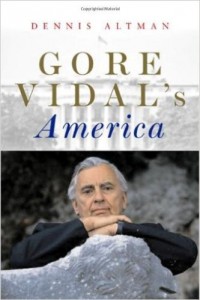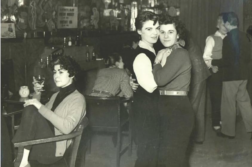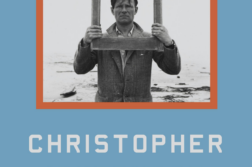 Gore Vidal’s America
Gore Vidal’s America
by Dennis Altman
Polity Press (Cambridge, UK)
216 pages, $19.95
IT IS HARD TO KNOW what history will make of Gore Vidal. At eighty, he has had a career perhaps more varied than any other living American writer. His feuds with Norman Mailer in the 1950’s and 60’s seem as quaint today as having only three TV channels. Yet Mailer, along with Vidal’s other contemporaries such as James Baldwin, Tennessee Williams, and Truman Capote, holds a stronger grip on our literary heritage and national imagination than does Vidal. Their books and plays are on the reading lists of college courses and in the university libraries; they have entered the American canon.
Vidal, on the other hand, has remained an enigma for critics and scholars, often marginalized from the core of American letters. “I write in so many different genres,” he said in an interview in 1990, “novels, screenplays, essays, stage plays, and so on. That seems to puzzle everyone. The general pattern isn’t easy to work out, so I don’t blame anyone for not trying.” Indeed, the list of his accomplishments over the past sixty years includes 25 novels, five plays, several screenplays for television and film, over 200 essays, and two memoirs. His first novel, Williwaw, set on an army transport ship off the coast of Alaska during World War II, received much critical praise when Vidal was only nineteen. His third novel, the one best remembered from his early years, was 1948’s The City and the Pillar, which explored or, as Vidal likes to say, “meditated on” the sexual attraction of two young men. It was a daring move for the young writer, bringing out a book that centers on homosexuality after so much early success. The critics dismissed it as merely a social tract on homosexuality. Some predicted that Vidal’s literary career was over.
In the 1950’s, he began writing stage plays and screenplays for film and television, working on the scripts for Ben-Hur and Suddenly, Last Summer, among others. Visit to a Small Planet was a successful television play that made a profitable transition to Broadway. The Best Man, set in a national political convention, was a Broadway hit and later made into a movie. After his unsuccessful campaign for Congress in 1960 (“You’ll Get More with Gore”), which garnered campaign support from Eleanor Roosevelt and Harry S. Truman, he returned to novel writing, publishing Julian in 1965, a novel about the Roman Emperor, which quickly became a New York Times best seller. Soon after he wrote Myra Breckenridge (1968), an eclectic novel that tells the story of a proto-feminist, transsexual protagonist’s adventures in Hollywood, which many critics consider his best work.
Throughout the 1970’s, while living in Italy—where he remained with his partner Howard Austen for four decades—Vidal wrote polemical essays for the New York Review of Books, Vanity Fair, and Playboy, among other publications, making more friends than enemies. His essays ranged across the Vietnam War, the inequalities of the American class structure, the moral bankruptcy of the middle class, and issues of sex and gender. He also wrote meditative essays on writers such as Henry James (his favorite) and Dawn Powell. He began what would become a sequence of historical novels that offered a retelling of the roots of American democracy: Burr (1973), 1876 (1976), Lincoln (1984), Empire (1987), and Hollywood (1989). His reputation as a harsh erudite critic of the United States and icon of the Left grew as rapidly as his celebrity status. He was comfortable in front of the camera, expanding his persona beyond his writings through television interviews, documentaries (mostly in Europe), and at least two films (Bob Roberts in 1992, Gattaca in 1997).
After Austen passed away in 2003, Vidal returned to his home in the Hollywood Hills, continuing to write. His most recent collection of essays Imperial America: Reflections on the United States of Amnesia (2005), along with a series of virulent pamphlets, condemn our invasion of Iraq and the imperial ambitions of the Bush administration.
His second memoir, Point By Point Navigation: A Memoir (2006), like his first, Palimpsest (1995), brims with encounters and intimacies with an eclectic crowd of celebrities from Greta Garbo to Johnny Carson, Italo Calvino, Orson Welles, Elia Kazan, Rudolph Nureyev, Charlton Heston, and Paul Newman. Born into Washington politics (his grandfather was a U.S. Senator from Oklahoma) and having a family connection with Jackie Kennedy, he enjoyed a brief time at the court of Camelot. Indeed Vidal was shaped as much by the world of politics as by the publishing world of New York or the studios of Hollywood. His critique of economic inequality in America comes from his experience as an insider to the patrician world that he has exposed and condemned.
In Gore Vidal’s America, Australian scholar Dennis Altman takes on Vidal’s critics, both past and present, and offers a useful and timely re-evaluation of his work. Altman’s landmark 1971 book, Homosexual Oppression and Liberation, acknowledged Vidal’s influence on his own thinking and that of other activists in the early years of gay liberation. In his book, Altman proposed a future free of sexual categories, citing “Gore Vidal’s hope that ‘homosexual’ will be used only as an adjective to describe behavior rather than as a noun to describe a person.” Such a notion seems far removed from our current cultural and political discourse, yet it’s a belief that Vidal has consistently advocated (along with his rejection of connecting romantic love with sex). He often claimed that his fifty-year relationship with Austen survived precisely because it didn’t involve sex.
Gore Vidal’s America was a long time in the making, emerging from a 35-year friendship between writer and subject. It is a slim, fast book—almost too fast, really, as its chapters speed from “Politics” to “Sex” to “Hollywood” to “Religion,” and so on. Part biography, part cultural history, part literary study, the book, like its subject, is hard to categorize. Altman’s central concern is to “demonstrate how Vidal ‘embodies’ a particular critique of American society and politics, and, as part of this seeks to subvert both the triumphalist view of American history and the mainstream assumptions of sex and gender.” There’s nothing really new here about Vidal’s life that can’t be found, say, in Fred Kaplan’s 2000 biography. Altman’s purpose is to locate Vidal’s writings in their historical and social context: “The works of Vidal reflect the period in which they were written: how could it be otherwise for so political a writer?” Vidal’s writings often proceed from a political vision, whether he writes about war or sex or Charles Lindbergh. “For Vidal politics is sexier than love,” writes Altman, and indeed politics for Vidal is sex and love and most everything else. For Altman, Vidal’s literary efforts fall into two major categories: the historical novels that offer a “close reading of what actually happened,” such as Lincoln or Empire, and a “series of ‘inventions,’ in which he subverts and re-imagines reality,” such as The City and the Pillar or Myra Breckenridge.
It strikes me as a bit strange but also consistent that the back cover of Altman’s book includes a blurb by Vidal himself, where he praises Altman’s analysis of the political and cultural landscape of the past sixty years, as well as the ascendant forces of America’s global empire, which “his protagonist stands so edgily aslant.” Protagonist? While Altman’s book offers a thoughtful and historically grounded study that reinvents Vidal, it moves too fast and celebrates too much, often getting entangled in its protagonist’s powerful and alluring persona. Throughout his career Vidal’s most important invention has been Vidal himself, playing the lead role as sardonic and witty critic of American hypocrisies.
James Polchin, who teaches writing at NYU, is completing a book on the life of George Platt Lynes.






